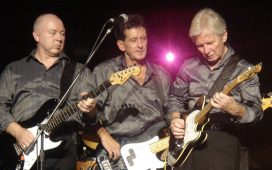The 2019 general election got everybody talking. From politicians to TV broadcasters, to journalists and families, the vote took over conversation at a time usually spent talking about the soap Christmas specials and what you want from Santa.
But as the country geared up to eventually give the Conservative Party a landslide, there were a number of previously politically vocal music acts that were suspiciously quiet.
‘There are still some huge UK bands/artists with massive platforms, and who use being socially progressive as a marketing tool, who have been silent in this whole election buildup,’ indie group Los Campesinos! tweeted.
‘Stand up and be counted or stop patronising us.’
And beneath their tweet, there were a number of specific rock artists being called out – most notably The 1975.
the 1975 spending 18 months positioning themselves as A Political Band then disappearing as soon as the election showed up is actually v funny https://t.co/BqDHy8V2gB
— matthew (@_mattsmith97) December 12, 2019
‘The 1975 spending 18 months positioning themselves as A Political Band then disappearing as soon as the election showed up is actually v funny,’ one post which is reaching 2,000 retweets said. Others called on The 1975 and lead singer Matty Healy to issue a distinct statement on what way they were voting.
The band has constantly used their platform to make political statements – whether that was projecting a Pride flag on their stage while performing Loving Someone, which was dedicated to the victims of the Pulse nightclub shooting, collaborating with Greta Thunberg or mentioning Donald Trump quotes on Love If We Made It.
Matty even said on stage at the Brits in 2017: ‘You can be scared of being perceived as being preachy, but the fact of the matter is, in times like this, art is way more important. It just is. People need to accept and do something about that. We’re going to try and do something about that.’
So the band’s silence throughout the election campaign was deafening for some fans. Matty tweeted about vote registration twice on 30 October and 11 November, but stayed quiet on who he would be voting for. In fact, he didn’t mention the election again until 5pm on election day, after The 1975 were called out repeatedly on their silence. Although he tweeted: ‘PLEASE VOTE TODAY. POLLING STATIONS CLOSE AT 10PM. MAKE YOUR VOICE HEARD. DON’T VOTE TORY’, he did not signal who he preferred. The band’s Twitter account never mentioned the election at all.
It wasn’t just The 1975 being called out for their dragging of feet. Despite their political lyrics and pro-environmental issues stance, Muse stayed quiet on the election, with Matt Bellamy previously saying: ‘I think when artists start getting into dangerous ground is when you start getting too partisan in any way.’
IDLES have been pro Labour in lyrics and on stage, but were called out for simply telling fans to vote, rather than sharing their preference (although they did later explain why they were voting Labour, on election day). Others were frustrated that stars like Harry Styles tweeted ‘VOTE’, with no clear stance.
‘The big-name artists out there, on the whole, are not outspoken about their political views because of how this could potentially tarnish their brand,’ Barbara Jamieson, lawyer and owner of Protect Your Empire, told Metro.co.uk. ‘By siding with one party over another, particularly during elections that are as contentious as this one, can alienate a significant portion of fans.
‘In addition, if an artist puts their eggs in one basket with one particular political party, they are basically tying their own brand to theirs. If there is a scandal at a later date, affecting that party, this could come back to smear the reputation of the artist. An outspoken celebrity will always be reminded of their public statements when a new story emerges.’
Music PR Lyle Bignon added: ‘Of course an artist or band may also be indifferent to politics, however we live in an era of polarisation where sitting on the fence in most senses is less and less popular; and in age where music, culture and politics are inextricably linked, many fans expect stars to be clear on where they stand when it comes to a General Election.
‘That said, aligning with any one political party or taking a clear political position can have far-reaching and damaging consequences in PR terms, not least because supporters and media from “the other side” might choose to target the artist and their fanbase online and offline. The more extreme the views of the person in question, the tougher the opposition.’
Many artists don’t discuss their politics, preferring to straddle the fence and keep their personal brand on the surface. But for acts that make a brand out of being outspoken and inherently political, relative silence on social media throughout the most important election in a generation sticks out like a sore thumb.
When asked why a political band like The 1975 stayed out of the spotlight, Jamieson said: ‘The same reason a lot of figures on social media have remained quiet – the country is already too torn. The fact is, no matter the outcome of the election, half of the country will be unhappy. Adding a celebrity opinion to this could add fuel to an already roaring fire.
‘It may be about protecting the brand, but I think it’s more about letting the country decide what they actually want, without too much influence from celebrities they look up to.’
However, Bignon reckons that staying neutral is about brand protection. ‘A lot of the time, keeping schtum about political leanings is about protecting a brand. But artists are also still human, with feelings and morals and ideals. In plenty of cases artists use their status, reach and platforms for good. The history of music in politics and politics in music goes back further than The 1975, past Stormzy, past Billy Bragg, past The Specials, past Joan Baez – and the two can very rarely be separated.
‘Shying away from making political comment is perhaps preferable to becoming embroiled in a Twitter war or having live shows boycotted by fans from certain ends of the political spectrum as a result of taking a stand, but where’s the personal, professional or artistic integrity in being silent at an important moment in the country’s future – especially if you have influence and reach?’
While many political rock and indie bands chose to sit back during the election, at least on social media, other areas of music were more vocal than ever. Leaving behind rock and punk as traditionally the most political genres, grime has taken over that mantle, and that has become extra clear in recent years in the mainstream.
Stormzy has rapped ‘f*** the government and f*** Boris’, wore a Banksy stab-proofvest at Glastonbury and endorsed Labour and Jeremy Corbyn in the election; JME became a prominent Labour campaigner and encouraged voter registration; never having voted before 2017, Akala has since become a prominent Labour supporter and a speaker on institutional racism and knife crime; and #Grime4Corbyn reached part of the electorate that hadn’t been reached out to before.
And even the mainstream has put their ‘punk’ counterparts to shame. Little Mix’s Jade Thirlwall has been praised for not only using the girlband’s huge social media following to urge their fans to register to vote, but explaining why she was voting Labour.
‘I will be voting @uklabour tomorrow for many reasons but firstly because I believe in their manifesto,’ the Newcastle-born singer said. ‘Coming from a working class background, I know it’s important that we have a government which supports everyone and not the few. We need to save our NHS. Labour believes in funding the arts. They support the fight against climate change. Their manifesto supports equality and the LGBT community.’
This is a band as mainstream as you can get – pure pop, formed on The X Factor – but they did more for mobilising young voters and explaining the Labour manifesto than many acts that would class themselves as true punks. Little Mix’s call to vote was sent out to an audience of 11.9 million on Twitter and 6.1m on Jade’s Instagram.
Dua Lipa urged her followers to vote Labour, while Emeli Sande joined a Labour campaign video, allowing her song You Are Not Alone to be used. Ellie Goulding tweeted: ‘Voted for the party with the most solid green policies. after all, we really don’t have anything without a healthy Planet #Vote #GetYourAssOutThereAndVote.’ Not acts that would be considered ‘edgy’ by many, but probably the most political artists on social media at the time of the election.
It may be that rock is dying off as the true punk, to be replaced by other genres more willing to speak up.
No artist is required to disclose who they will be voting for – but as Generation Z becomes more and more political and mobilised, they are not going to stand for idols that sit on the fence. And they definitely won’t stand for artists who position themselves as anarchists or politically minded, only to keep quiet when it counts.
Got a showbiz story?
If you’ve got a celebrity story, video or pictures get in touch with the Metro.co.uk entertainment team by emailing us celebtips@metro.co.uk, calling 020 3615 2145 or by visiting our Submit Stuff page – we’d love to hear from you.
MORE: Giggs says being banned from US is ‘like parole’ as he admits he misses country




















